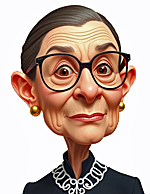Rock Star, My Ass

Calling someone a “rock star” has become lazy cultural shorthand for describing a person who is wildly successful, charismatic, or influential in his or her field—even when that field has nothing to do with music played to hordes of stoned people waving cell phones. Rock star is often used with more admiration than originality … tossed around like frisbees at a Phish show. That is why it often veers into hyperbole or irony.The following ten “rock stars,” through no fault of their own, illustrate the journalistic folly of lumbering people with that clapped out cliche.
Ruth Bader Ginsburg – Famous for her jurisprudence and advocacy for gender equality, “The Notorious RBG” became a cultural icon late in life. Yet she was famously un-notorious, soft-spoken, meticulous, and almost monklike in demeanor. Her uniform of lace jabots and judicial robes had more in common with a scholastic than a stadium rocker.
Anne Burrell – Known for her dynamic presence on Worst Cooks in America and her spiky platinum hair, Burrell infused the kitchen with personality. Yet while she adopted the “rock star chef” title, her culinary ethos was grounded, disciplined, and rooted in classical technique—not exactly mosh pit material.
Anthony Fauci – Elevated to household-name status during the COVID pandemic, Fauci became a symbol of calm in chaos. Although media types dubbed him a “rock star scientist,” he approached every microphone with the measured cadence of a career immunologist.Think white lab coat, not black leather jacket.
Steve Jobs – Revered for his innovation and vision at Apple, Jobs had the focus and stage presence of any frontman; but despite the jeans and black turtlenecks, his persona was part Zen monk, part exacting boss—more minimalist symphony than glam rock opus.
Greta Thunberg – Her passionate advocacy and climate strikes earned her thunderous applause worldwide, especially among gullible youth. Still, Thunberg’s demeanor—fiercely earnest, prune-faced, and starkly anti-consumerist—runs counter to the excess and theatrics typically associated with rock stars.
Barack Obama – Although he was praised for his “rock star charisma,” Obama’s appeal lay in his intellectual cool and rhetorical finesse. His preferred settings were policy roundtables and thoughtful interviews—not mosh pits and light shows. He had presence, sure—but not performative bravado. Besides, no rock star wears a tiny American flag lapel pin.
Elon Musk – Frequently called a “rock star CEO,” Musk garnered attention for his eccentricity, bombast, and drug use. Yet for all the spectacle (X posts, flamethrowers, SNL), his charisma often came wrapped in awkward delivery and niche humor. More comic book convention than concert tour.
Malala Yousafzai – A Nobel laureate and fearless advocate for girls’ education, Yousafzai inspires millions with her quiet strength. Her voice is serene, her wardrobe modest, and her demeanor resolute but humble—qualities far from the in-your-face impact of rock idol imagery.
Neil deGrasse Tyson – He is celebrated for making astrophysics accessible, yet it is Tyson’s enthusiasm and baritone delivery that earned him legions of fans. His public image, though, is more tweedy science communicator than rebellious showman—more Cosmos than Coachella.
Jacinda Ardern – As New Zealand’s prime minister, Ardern won acclaim for her empathy-driven leadership during crises. Her calm, relatable presence and focus on kindness made her a standout among world leaders—but it hardly suggested backstage parties and sunglasses after dark.
In each case above, the “rock star” label says more about media shorthand than the individuals themselves. It’s an easy way to signal cultural relevance—but it sacrifices nuance on the altar of flash. The real story is far more human and, in many ways, more compelling.

